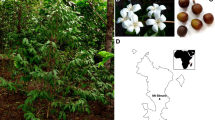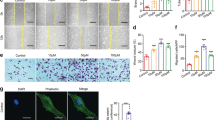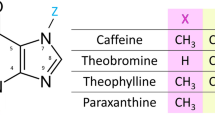Abstract
THE mutagenic and chromosomal aberration activity of caffeine (1,3,7-trimethylxanthine) has been demonstrated in human tissue cultures1, bacteria2, Ophiostoma3, and onion root tips4. In mice the data are indeterminate5,6 and this is also the case in Drosophila because Andrew7 reported mutagenic effect of caffeine although Yanders and Seaton8 reported a lack of mutagenicity.
Similar content being viewed by others
Article PDF
References
Ostertag, W., Duisberg, E., and Stürmann, M., Mutation Res., 2, 295 (1965).
Demerec, M., Bertani, G., and Flint, J., Amer. Naturalist, 85, 119 (1951).
Zetterbers, G., Hereditas, 46, 279 (1959).
Kihlman, B., and Levan, A., Hereditas, 35, 109 (1949).
Cattanach, B. M., Z. Vererbungslehre, 93, 215 (1962).
Lyon, M. F., Phillips, J. S. R., and Searle, A. G., Z. Vererbungslehre, 93, 7 (1962).
Andrew, L. E., Amer. Naturalist, 93, 135 (1959).
Yanders, A. F., and Seaton, R. K., Amer. Naturalist, 96, 277 (1962).
Mittler, S., and U, R., Science, 152, 1087 (1966).
Author information
Authors and Affiliations
Rights and permissions
About this article
Cite this article
MITTLER, S., MITTLER, J. & OWENS, S. Loss of Chromosomes and Nondisjunction induced by Caffeine in Drosophila. Nature 214, 424 (1967). https://doi.org/10.1038/214424a0
Issue date:
DOI: https://doi.org/10.1038/214424a0
This article is cited by
-
10.1007/BF00287092
CrossRef Listing of Deleted DOIs (2011)
-
Effects of caffeine on chromosomal loss and nondisjunction in Drosophila melanogaster
Genetica (1973)
-
Does caffeine induce dominant lethal mutations in mice?
Human Genetics (1969)



